Solvista Health Focused on Community Needs in its Four-County Region
A conversation with Solvista Heath Centers CEO Brian Turner is bound to be optimistic, as he discusses the gains made by the nonprofit he leads, which holds the primary contract to serve the behavioral health needs of a four-county area; Chaffee, Custer, Fremont, and Lake counties.
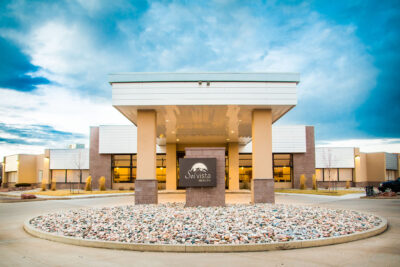
Solvista Health Cañon City East Campus at 3225 Independence Rd.
The state’s 64 counties are divided into and served by 17 Colorado Behavioral Health Centers, each with a defined service area. It is sobering when one realizes that as much as this mental health resource does, the need is growing faster than ever.
“We just submitted our totals for individuals served to the State, and it was actually higher than originally thought,” said Turner, who noted that only a few months ago, an earlier report to the state dated June 30, 2021 listed 5,024 individuals served. “We’ve served 5,300 so far in FY21 and the year is not over. So that is 96 percent more than in 2017.”
The nonprofit has served its four-county region for nearly 60 years, with at least 22 behavioral health program areas and 180 employees. As a Colorado behavioral health region, Solvista is neither the largest nor the smallest provider. It maintains six offices (two of them in Cañon City) one in Westcliffe, two in Chaffee County (in BV and Salida), and another in Leadville.
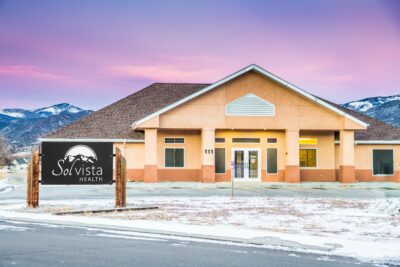
Solvista Health center at 111 Vest Rd. in Salida. Courtesy photo
“At Solvista, we know who we are and what we stand for,” says Turner, who pointed out that he served on the Colorado Behavioral Health Task Force that testified at the Colorado Statehouse in front of the legislature in support of the bill that has authorized the formation of a new Colorado cabinet-level Dept. of Behavioral Health. While that new state department has enormous support, there are some who say it may just add another level of government to a system with too much already.
Turner says he’s been a supporter of the new department since the beginning. “I wanted it done well, with consumer voices at the table, not something that would just grow government, so I served. I put in over two years on that task force.”
Just lately, Turner says he’s wanted to speak out about some of what he calls “misconceptions” regarding the state’s regional mental health services, particularly in aspects of operations for which they get blamed, and the centers can’t control. “Well for one thing, we do accept Medicare, but they won’t pay for licensed professional counselors, only license clinical social workers, or LPCs, or case managers,” he began. “That is rarely brought up and it’s a gap in insurance.”
“For another, the survey you wrote about last month, by Mental Health America discusses prevalence rates [in the state], but there is a huge issue with commercial insurance; many of these plans have a gap in that they don’t cover youth with mental health needs and substance abuse needs. That is a direct attack on parity and that’s on insurance companies, not on the providers.”
The question of transparency has recently been raised about these 17 behavioral health centers, all of whom are nonprofits. While they file nonprofit IRS 990s, they do not have public boards and each receives massive amounts of government funding from Medicaid and Medicare. In fact, the Medicaid formula appears to favor organizations with higher per hour counseling costs (which some say appears to indicate that the higher the cost, the more Medicaid refund centers get per client.)
Turner took issue with transparency questions raised in a recent story by one of our COLab partners in the state-wide series called “OnEdge”.
“Solvista is held to a tremendously high standard of accountability; the statement that there is no transparency is very concerning to me,” said Turner. “The previous article indicated that there was little oversight, but we keep close tracking at a federal and a state government level, and the county. We submit over 180 mandated audits and reports every year — on average that’s every two to two and a half days we are submitting something, somewhere as part of our contract oversight.”
“We are so regulated,” he added. ” Reports to behavioral health, Medicare, the Dept. of Health and Environment, the Dept. of Regulatory Agencies, the Judicial Dept. — they are not well aligned – they each have their own trackable items. We’re providing a ton of information but there is no feedback loop….here’s another example: in the reports we don’t even include what we do in human resources — we’re an equal opportunity employer, we have to comply with affirmative action, we ensure our staff is in good standing with licensing, and [hold] credentials with insurance payers.” He paused. “If they ask why the rates are high it’s the tremendously high standard.”
Year Clients served by Solvista
2017 2,703
2021 (Dec.) 5,300
Turner pointed out that over the past three years, Solvista’s service rate with individuals has increased 85 percent. “It’s not going down in our southern Colorado region, we’ve never had such demand for services. We’re working very hard to have more service locations, our mobile crisis program is the best in the state. We’ve set up a law responder program, we do school day and jail-based services and we do supportive employment programs. ”
Also in response to the increased need, Solvista Health has created three new programs:
- Promoting Hope; a suicide prevention effort for those patients at high risk;
- Project Spirit, an approach to short-term disaster behavioral intervention support for those in crisis; supportive employment expansion in Lake and Chaffee counties
- iMatter, a program to give every teenager three vouchers for telehealth help and treatment programs that can be expanded statewide.

Governor Polis, left, visits Solvista Regional Assessment Center construction site with former State Representative Jim Wilson. Photo courtesy of the governor’s office
This year, after a decade of hopes within the region that those needing behavioral health services don’t have to spend hours waiting for a bed, and then be transported down to the Front Range, a new center is in the works.
A new Solvista Regional Assessment Center is under construction on the campus of the Heart of the Rockies Regional Medical Center, to be completed in April, 2022.
The center has attracted the attention of the state’s highest leadership: both Governor Jared Polis and U.S. Senator John Hickenlooper have made official visits to the construction site.
Turner explains that with the addition of the new assessment center, Solvista Health will be able to offer four levels of service for the assessment center in the future.
These range from acute short-term crisis level treatment, longer-term treatment for substance detox and mental health issues, and ongoing recovery support.
But quiet conversations with others in the community show that compared to this progress, there are growing unmet needs. While Solvista has nearly doubled its client load in four years, the need may well have quadrupled.
2021 Client Service breakout (fiscal year July 1, 2020 through June 30, 2021)
- Adults 3,961
- Youth 1,063
- Total telehealth 3,939
- Total crisis services 1,322
The four-county Solvista service area of Fremont, Custer, Chaffee, and Lake counties, like the rest of the state, is in a growing youth mental health crisis.
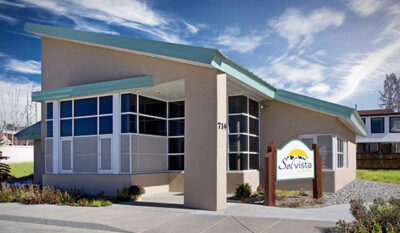
Solvista Health center at 714 Front St in Leadville. Courtesy photo
Broken out by adults and children, the latest fiscal year service report shows that 26.8 percent of Solvista services were directed toward children and youth.
In fact, within the four-county area, Chaffee County children represent the largest percentage of the total county caseload who have required mental health services in the latest fiscal year:
County Adults Children %/Children
Chaffee 974 303 31.1
Fremont 2,063 577 28.0
Custer 159 38 23.9
Lake 514 106 20.6
Getting an Appointment
While hopes are pinned on the new Regional Assessment Center, other aspects of service represent growing frustration. As with other regional behavioral health centers across Colorado, it can take six to eight weeks for an appointment to get services from Solvista, something that those needing help repeatedly raise as a barrier to getting support when it is most needed.
But what potential clients and even those currently getting mental health services may not realize, is the mountains of paperwork and approvals that must be done before a person is placed; and not just placed, but with the right counselor for the situation.
A conversation with a Solvista peer specialist (employees who counsel individuals and families based on their own life experiences) reveals that this can be as frustrating on their side as on the client-side.
“I think the only breakdown is the time it takes to get into services. That’s because you have to get all the paperwork together, because the kind of insurance they have dictates which kind of clinician you can see, or if it’s a licensed social worker, or if they are qualified to work with Medicaid, or Medicare,” she explained. “There are only one or two who do Medicare. There are all these regulations to get in before even seeing a therapist.”
In response to the pressing need, exacerbated these past 20 months by the COVID-19 pandemic, Solvista has made service changes. It has added extra clinician hours on evenings and Saturday mornings. When the state began to allow it this past year, it added telehealth appointments. “We do what we can with limited number of clinicians that there are…the intake is a lot of hoop-jumping, added the peer specialist. “It’s frustrating for people who don’t realize the process — who think you can just walk in.”
Programs exist to help
While intake for long-term program support can take weeks to set up, Solvista has activated two programs to help individuals experiencing two very different need categories;
A 24/7 mobile crisis line — for those experiencing an immediate crisis.
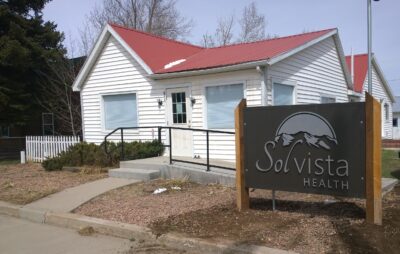
Solvista Health center at 511 Main St. in Westcliffe. courtesy photo
“People should know that they can call and ask to talk to crisis services at any time, even on weekends – there is no charge for that,” said the peer specialist. “There might be a wait [on hold] because they’re online with someone else, but there is crisis counseling support. You can call any time, weekends too, to talk to the crisis line.”
Solvista 24/7 — call any of the general numbers and say “I need to take to somebody in crisis counseling,” and it will roll to the 24/7 crisis line
Colorado Crisis services lines:
1-800-493-8255
1-844-493-8256
ACT teams — which stands for ” assertive community treatment teams,”
These specialized teams meet a national service model. They are set up to wrap a support team around individuals who truly need help functioning in most aspects of life, often those who are homeless, who have to be reminded to show up for appointments.
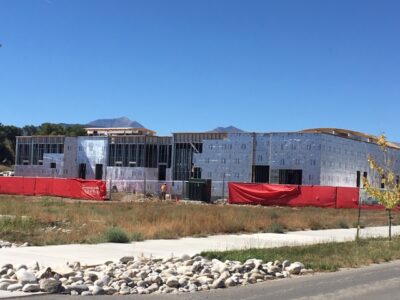
The new Solvista Health Regional Assessment center is under construction on the HRRMC campus. AVV file photo.
The peer specialist pointed out what the general public may not see in a homeless street person; “Unless they are psychotic, it’s not illegal to be psychotic and homeless. They are not a threat, but nobody can force them to get treatment or go somewhere to get treatment. they have to be talked into it, then there are the insurance hurdles — different facilities take different insurance….. it’s complicated to get people into services.”
“Sometimes,” she added, we have to find stopgap days between places with no spaces, and others who don’t take one insurance or another. It’s a lot of crossing Ts and dotting Is.”
Solvista points out that there are also wrap-around programs for families — to ensure families and kids are getting the help for the family structure. “Say the grandparents are raising the kids, who have been through trauma, but with behavioral health outreach, there are classes for grandparents and support for the caregivers.”
Quiet conversations with others in the community show that there are growing unmet needs. While Solvista service area includes minority populations, it is not yet addressing these needs at the level it aspires to and the state is documenting a crisis situation with youth mental health.
Part II coming in late winter: Solvista’s Community Role, Cost Per Patient Hour, and Addressing the Gaps








Recent Comments